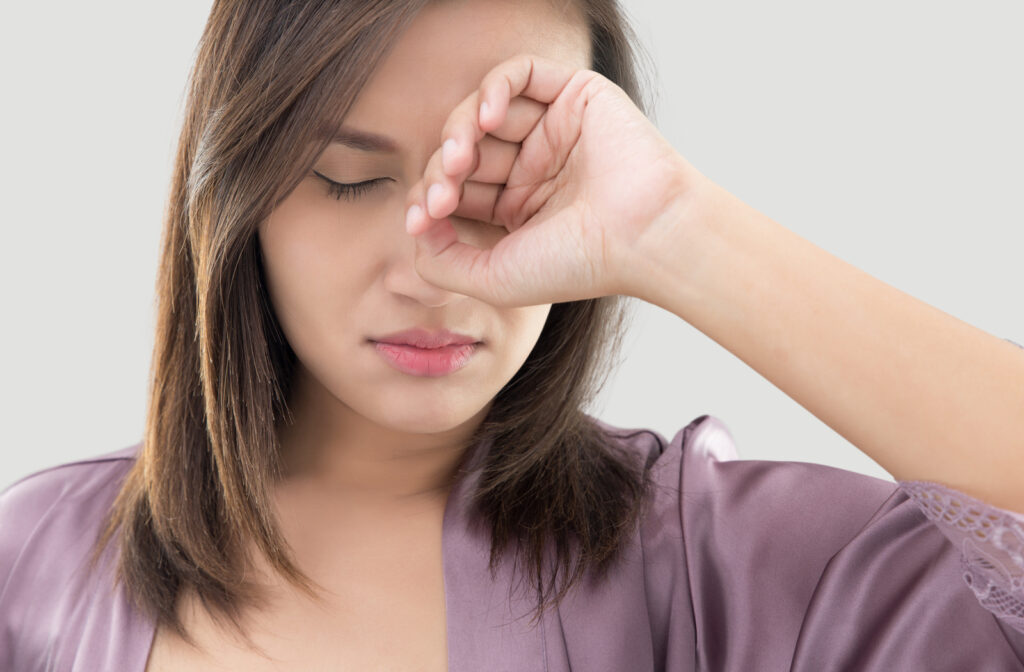Seeing Spots & Feeling Dry?
When unusual spots are floating across your vision, you might wonder if you have an eye problem. It’s always wise to get your eyes assessed when you experience vision or eye changes. After an eye exam, your optometrist can determine if you’re experiencing a symptom of ocular disease, including chronic dry eye. If you suffer from dry eye, you may experience multiple symptoms. But are floaters a symptom of dry eye?
What Are Floaters?
Floaters come in many shapes and sizes. The floating spots, specks, strings, and squiggles can seem to appear in front of your vision but are located inside your eye. Floaters are clumps of cells trapped in the vitreous humor layer of your eye.
The vitreous is a transparent, gel-like substance that fills the space between the lens and the retina. It helps the eye retain its round shape, absorbs shock, and allows light to pass through the eye. Notably, the vitreous is 99% water, so when objects inside the vitreous humor can float around the space.
Although the vitreous is mostly water, it also contains proteins. When the vitreous and proteins deteriorate, typically because of aging, they can form clumps. The protein clumps can also form naturally in the eye before birth.
In most cases, floaters are harmless. However, they can also be a symptom of an eye injury or an ocular disease. Therefore, when you notice floaters, seeing an optometrist for an eye exam is vital to determine if the cause of your floaters requires treatment.
What Is Dry Eye Disease?
Dry eye disease, sometimes called dry eye, describes chronic and recurring dry eye symptoms. For example, you might experience dry eyes if you don’t drink enough water, have a poor night’s sleep, or a dry wind blows across your face. Dry eye disease is generally caused when your eyes don’t produce enough tears, or the tears are of poor quality.
Common symptoms of dry eye include:
- Blurry vision
- Burning, gritty, or scratchy eyes
- Feeling something in the eye(s)
- Light sensitivity
- Redness or irritation
- Stringy mucus
- Watery eyes
Prolonged dry eye can damage the eye’s surface, leading to worsening symptoms and vision problems. Your optometrist can diagnose your eye health and recommend options for dry eye therapy.
What Causes Dry Eyes and Floaters?
Chronic dry eye can increase the risk of eye problems and vision impairment. But dry eye disease does not cause floaters. You can, however, experience dry eyes and floaters at the same time.
You may experience both because they can share risk factors. For example, some common risks for both eye conditions include aging, eye injuries, and diabetes.
Aging
Many people develop floaters as they get older. Unfortunately, aging also increases the risks of many eye conditions and diseases, including cataracts and dry eye. Dry eye affects up to 30% of adults over age 50. It’s also common for patients to have cataracts and dry eye together because of aging—before and after cataract surgery.
As aging eyes can be prone to multiple eye conditions, it’s crucial to have regular comprehensive eye exams.
Eye Trauma
The vitreous cushions your eye and helps protect it from trauma, but a significant injury can penetrate the vitreous humor. An injury or trauma that causes damage to the eye’s surface, such as a corneal abrasion, can also lead to dry eye. Patients can also experience dry eye as a delayed symptom after an eye injury.
Although most floaters are clumps of cells, any object that enters the vitreous humor can get trapped. For example, suppose you experience eye-bleeding due to an injury or ocular disease. In that case, the fluid can float inside the vitreous chamber.
Seeing a healthcare professional after an eye trauma is crucial. You can contact your optometrist to evaluate and treat any condition affecting eye health, including emergency eye care.
Diabetes
Diabetes is the leading cause of vision loss in adults (ages 18–64). Yet, routine eye exams can help prevent up to 95% of vision loss caused by diabetic eye disease.
Seeing spots or floaters is a common symptom of diabetic retinopathy. Additionally, the nerve damage and inflammation caused by diabetes can affect tear production, leading to chronic dry eye. Floaters and dry eye symptoms can occur with type 1 and type 2 diabetes.
Preventing symptoms is possible with preventative eye care. Contact your optometrist to book a diabetic eye exam.
Treatment for Dry Eye & Floaters
When dry eye or floaters are connected to ocular disease, it’s crucial to see your optometrist for a diagnosis. After determining the cause of your symptoms, your eye care team can develop a treatment plan.
Dry eye therapy can include:
- Artificial tears & medicated eye drops
- Eyelid treatment (eye masks, lid wipes)
- In-office procedures
- Nutritional supplements
- Punctual plugs
As floaters are typically harmless, you may not require treatment for floaters. However, suppose floaters interfere with vision or occur with another condition affecting the vitreous. In that case, you may be a candidate for a vitrectomy.
The surgical procedure removes the vitreous humor, also removing any floaters suspended in the fluid. Then, the empty vitreous chamber with an artificial fluid to help protect the eye.
See Us for Eye Care Questions
Relief for dry eye is available, and we’re committed to offering a personalized solution. Whatever your eyes need, our friendly team of professionals can help.
Contact your optometrist when you experience any eye symptoms, from eye discomfort to floaters. We can help you manage your eye health. Please don’t hesitate to give us a call! Our team is ready to answer your questions about your eye care.
Book an appointment with Optical Illusion today!



